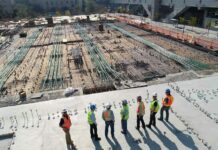According to a recent study, confidence among practitioners has fallen to levels not seen since the first COVID lockout, prompting the Royal Institute of British Architects to issue a warning about an anticipated decline in workloads in the coming months.
As per the institute, the downturn would probably continue into the following year, and the UK’s response to the energy issue would determine when growth would resume.
The announcement comes as RIBA released its most recent Future Trends study, which revealed that over a third of architects now anticipate lower workloads over the next 3 months, while only 16% anticipate higher workloads. It is the gloomiest prediction the survey has provided since the 2009 financial crisis, with the exception of the first 2 months of the first COVID lockdown.
Three of the four labour sectors had a decrease in optimism, with the best-performing sector in recent years, private housing, falling to a balance value of -17 in the survey, a drop of 37 points since January. Any value less than zero means that practitioners anticipate a decrease in workload.
London had the lowest level of confidence out of all the regions, with an equilibrium score for September that dropped from -7 in August to -23. The workloads in London practises are, on average, 86% lower than they were a year ago. The North of England dropped below zero for the first time since June 2020, whereas the South of England, the Midlands, and East Anglia each declined further, with scores of -20 and -21, respectively. All regions are now in the negative zone.
Practices foresee staff losses over the next three months for the first time in two years, and fewer businesses anticipate hiring more temporary workers than they did last year. The results of the poll were deemed stark by Adrian Malleson, head of economic research and analysis at RIBA.
He declared, they observe concern across all areas and sectors. The UK economy and the construction industry continue to be burdened by Brexit, inflation, rising interest rates, the post-COVID rebound, the war in Ukraine, and waning market confidence in UK fiscal policy.
The workloads of architects are probably going to decrease in the upcoming months and into the following year. The UK’s approach to the energy crisis and whether they start seriously developing a design-led, sustainable architecture will determine in part whether there will be a return to growth. According to Malleson, the RIBA will continue to share the survey’s results with the government and collaborate with other built-environment organisations to track prevailing patterns.
Following Liz Truss’ resignation as prime minister on October 20th, the survey was released. This comes amid a fast-worsening political and economic crisis that has been stoked by the government’s failed attempts to combat increasing inflation and fuel prices with underfunded tax cuts.
The election for a new prime minister is anticipated to take place within the coming week, and Boris Johnson is reportedly planning to run alongside former chancellor Rishi Sunak.




























